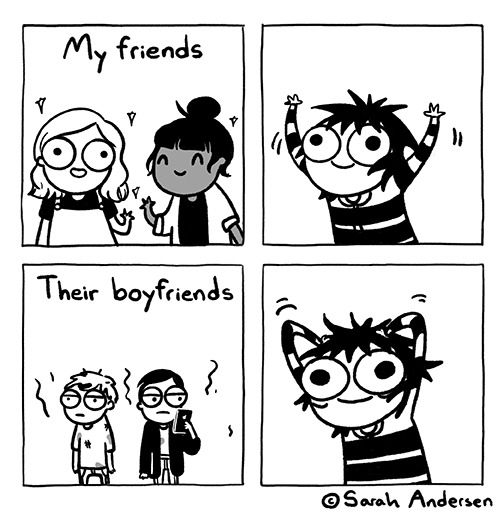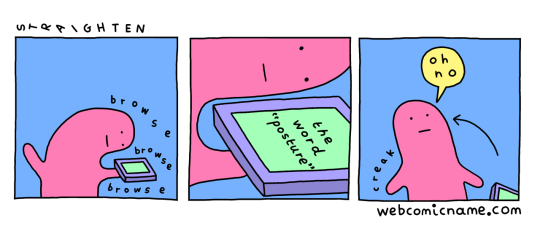Text
hell yeah halloween party house
133K notes
·
View notes
Text

12K notes
·
View notes
Text
Does anybody else think “man, I’d do so many things if I felt better” but once you feel better you don’t do anything cuz you just want to chill and enjoy not feeling bad?
66K notes
·
View notes
Text
There are some very angry people in my notes and inbox this week. Apparently, I am “toxic” and “evil” because I reported the results of 50 years of weight-loss research. They are mad because the research definitively and conclusively demonstrates that long-term maintenance of weight loss is virtually impossible. They also think I am “delusional” because I criticize the medical establishment for keeping this fact a secret from the general public.
The truth is that the ineffectiveness and harmful nature of intentional weight-loss is well known within the scientific and medical communities. If pressed, most doctors will affirm that their clinical experience conforms to the scientific results: Basically everyone who loses weight will go on to regain that weight within 3-5 years. In 75% of cases, they will regain more weight than they lost.
This knowledge is why doctors became so desperate that they resorted to amputating parts of the digestive tract in the hopes that it might finally result in long-term weight-loss. Except oops, that doesn’t work either. Oh, and it causes death, addiction, malnutrition, and suicide. Whoopsie daisy.
Diet culture is fucking toxic. And people deserve to know the truth.
51K notes
·
View notes
Text
Since I’m not seeing her name nearly enough on the press, let’s give the attention Katie Bouman deserves. Thanks to her, we are now possible to see the first ever image of a black hole, something that people talked 200 years ago for the first time. It’s no longer a myth.
We are girls and we can be whatever we want to be. Einstein would be proud of you, Katie. Thank you!
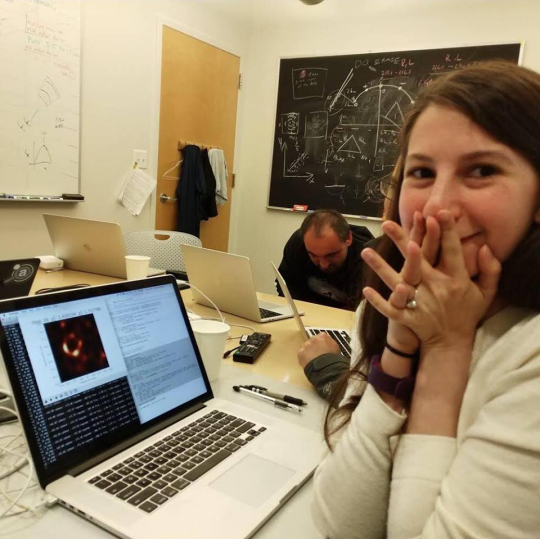
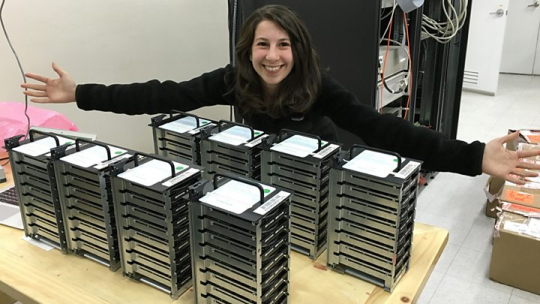
Here you can see a huge stack of hard drives she used for Messier 87’s black hole image data.
139K notes
·
View notes
Text
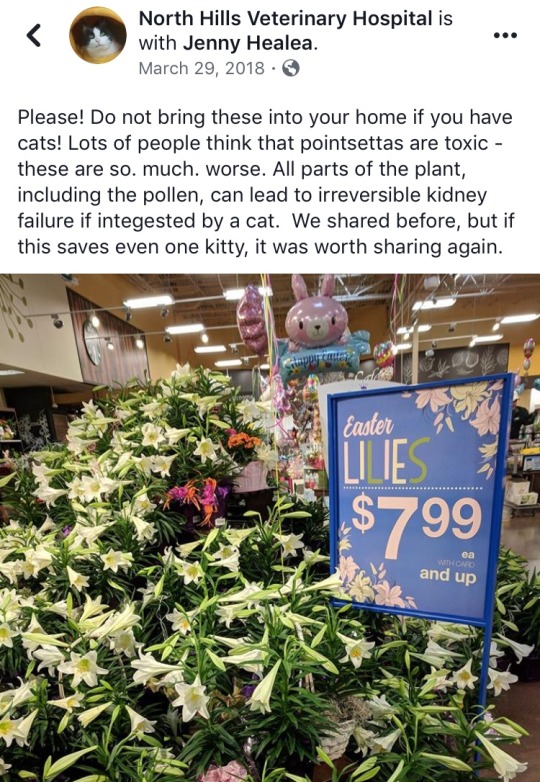
Seriously just a bit of pollen could make your cat sick within a matter of minutes. Stay far away from Easter lilies if you have kitties!
99K notes
·
View notes
Text
Hey y'all, right now, Gamestop is asking people to donate to Autism $peaks, and as an Autistic person, I would just like to say
DO NOT FUCKING DONATE TO AUTISM $PEAKS
If you really want to donate to someone actually helping autistic people get jobs like they’re saying it’s for, fucking Microsoft would be better.
Autism $peaks is a hate group.
They openly advocate for the extermination of autistic people.
Every single one of their founders and chairpersons have openly admitted to contemplating the murder of their autistic child - in detail.
They advocate for a cure and support outdated and falsified information that a) vaccines cause Autism - Autism is genetic, the only “cure” is genocide - and b) white cis boys are the majority “afflicted”.
They compare Autism to cancer and use fearmongering to gain supporters. (Actual things their ads have said: Autism will ruin your marriage, Autism is invisible until it’s too late, Autism causes more deaths than any terminal illness, etc, etc.)
They support electroshock therapy and ABA institutions like the Judge Rotenberg Center (seriously, google it).
If you want to donate to charities actually doing good work for Autistic people, donate to The Autistic Self-Advocacy Network (ASAN - @autisticadvocacy ) or The Autistic Women & Non-Binary Network (AWN - @awn-network ).
All of this could be found out with 30 seconds of googling, I don’t understand why companies insist on supporting a literal fucking hate group when there is so much out there about why not to and so many other, much better, charities to support.
Allistic people - please fucking reblog this
Tagging - @autie-jake @thatoneguy157 @butterflyinthewell
17K notes
·
View notes
Photo




today i learned of the Pyralid moth genus Pachypodistes and it healed me of 100 hit points
sources 1 & 2, 3 & 4
17K notes
·
View notes
Text
A doctor discovers an important question patients should be asked
This patient isn’t usually mine, but today I’m covering for my partner in our family-practice office, so he has been slipped into my schedule.
Reading his chart, I have an ominous feeling that this visit won’t be simple.
A tall, lanky man with an air of quiet dignity, he is 88. His legs are swollen, and merely talking makes him short of breath.
He suffers from both congestive heart failure and renal failure. It’s a medical Catch-22: When one condition is treated and gets better, the other condition gets worse. His past year has been an endless cycle of medication adjustments carried out by dueling specialists and punctuated by emergency-room visits and hospitalizations.
Hemodialysis would break the medical stalemate, but my patient flatly refuses it. Given his frail health, and the discomfort and inconvenience involved, I can’t blame him.
Now his cardiologist has referred him back to us, his primary-care providers. Why send him here and not to the ER? I wonder fleetingly.
With us is his daughter, who has driven from Philadelphia, an hour away. She seems dutiful but wary, awaiting the clinical wisdom of yet another doctor.
After 30 years of practice, I know that I can’t possibly solve this man’s medical conundrum.
A cardiologist and a nephrologist haven’t been able to help him, I reflect,so how can I? I’m a family doctor, not a magician. I can send him back to the ER, and they’ll admit him to the hospital. But that will just continue the cycle… .
Still, my first instinct is to do something to improve the functioning of his heart and kidneys. I start mulling over the possibilities, knowing all the while that it’s useless to try.
Then I remember a visiting palliative-care physician’s words about caring for the fragile elderly: “We forget to ask patients what they want from their care. What are their goals?”
I pause, then look this frail, dignified man in the eye.
“What are your goals for your care?” I ask. “How can I help you?”
The patient’s desire
My intuition tells me that he, like many patients in their 80s, harbors a fund of hard-won wisdom.
He won’t ask me to fix his kidneys or his heart, I think. He’ll say something noble and poignant: “I’d like to see my great-granddaughter get married next spring,” or “Help me to live long enough so that my wife and I can celebrate our 60th wedding anniversary.”
His daughter, looking tense, also faces her father and waits.
“I would like to be able to walk without falling,” he says. “Falling is horrible.”
This catches me off guard.
That’s all?
But it makes perfect sense. With challenging medical conditions commanding his caregivers’ attention, something as simple as walking is easily overlooked.
A wonderful geriatric nurse practitioner’s words come to mind: “Our goal for younger people is to help them live long and healthy lives; our goal for older patients should be to maximize their function.”
Suddenly I feel that I may be able to help, after all.
“We can order physical therapy — and there’s no need to admit you to the hospital for that,” I suggest, unsure of how this will go over.
He smiles. His daughter sighs with relief.
“He really wants to stay at home,” she says matter-of-factly.
As new as our doctor-patient relationship is, I feel emboldened to tackle the big, unspoken question looming over us.
“I know that you’ve decided against dialysis, and I can understand your decision,” I say. “And with your heart failure getting worse, your health is unlikely to improve.”
He nods.
“We have services designed to help keep you comfortable for whatever time you have left,” I venture. “And you could stay at home.”
Again, his daughter looks relieved. And he seems … well … surprisingly fine with the plan.
I call our hospice service, arranging for a nurse to visit him later today to set up physical therapy and to begin plans to help him to stay comfortable — at home.
Back home
Although I never see him again, over the next few months I sign the order forms faxed by his hospice nurses. I speak once with his granddaughter. It’s somewhat hard on his wife to have him die at home, she says, but he’s adamant that he wants to stay there.
A faxed request for sublingual morphine (used in the terminal stages of dying) prompts me to call to check up on him.
The nurse confirms that he is near death.
I feel a twinge of misgiving: Is his family happy with the process that I set in place? Does our one brief encounter qualify me to be his primary-care provider? Should I visit them all at home?
Two days later, and two months after we first met, I fill out his death certificate.
Looking back, I reflect: He didn’t go back to the hospital, he had no more falls, and he died at home, which is what he wanted. But I wonder if his wife felt the same.
Several months later, a new name appears on my patient schedule: It’s his wife.
“My family all thought I should see you,” she explains.
She, too, is in her late 80s and frail, but independent and mentally sharp. Yes, she is grieving the loss of her husband, and she’s lost some weight. No, she isn’t depressed. Her husband died peacefully at home, and it felt like the right thing for everyone.
“He liked you,” she says.
She’s suffering from fatigue and anemia. About a year ago, a hematologist diagnosed her with myelodysplasia (a bone marrow failure, often terminal). But six months back, she stopped going for medical care.
I ask why.
“They were just doing more and more tests,” she says. “And I wasn’t getting any better.”
Now I know what to do. I look her in the eye and ask:
“What are your goals for your care, and how can I help you?”
-Mitch Kaminski
Source
110K notes
·
View notes
Text
ya'know, maybe the reason rural, small-town people don’t trust national media is because national news outlets pretty much ignore 85% of the country.
nebraska is literally flooded, at least one person has died and three are missing, 60 thousand have evacuated… and the first cnn article about this went up like ten minutes ago and only mentioned flooding around omaha.
like. i’m from omaha and i’m frustrated by the lack of attention the rest of our state is getting. someone died, and you’re not going to mention that? how was this not a story worth reporting this morning? are nebraskan farmers and small-town citizens not just as important as the californians displaced by wildfires, or southern/east coast people affected by hurricanes?
when we complain about nebraska being ignored, we’re not really talking about not having shows set in nebraska, as much as we might want that. we’re talking about this — thousands of people losing their homes, their livelihood, and yet no one seems to think it’s worth mentioning.
when hurricanes devastated the south last year, nebraskans donated what we could to help those affected. we sent trucks filled with donated items and coordinated with shelters and organizations to make sure we actually sent things that were needed. i’m just saying, it would be nice to see some of that support in turn. even if it’s just bringing attention to this.
54K notes
·
View notes
